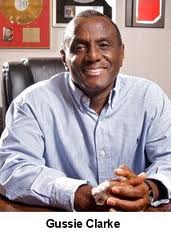
By Jordane Delahaye—
Pop Quiz: What is the most successful reggae song in 2012? Who won the 2012 Grammy for best reggae album?
Too many Jamaicans are not able to answer those questions correctly. Reggae music has come a long way since its inception in the 1960s but the evolution seems to be greeted with waning interest.
It is unfortunate that the birthplace of one of the most unique and transcending music genres seems to have forgotten about it.Local radio stations would sooner play dancehall or bubblegum pop songs than they would reggae music. This is not to say that they’re to blame – they are only catering to the needs of the vast majority of their listeners. So who is the culprit here?
Veteran reggae producer, Gussie Clarke, told The Sunday Gleaner that while it might seem that way, he does not believe reggae is a dying genre.
Clarke believes that reggae music is well represented in Jamaica, even though he named German reggae sensation, Gentleman, as today’s biggest reggae act.
Since the ’70s, Gussie Clarke has been one of Jamaica’s top reggae producers, having worked with some of the bigger names in the genre – Dennis Brown, Gregory Isaacs, Freddie McGregor just to name a few.
While acknowledging that there is much uncertainty surrounding the future of reggae, Clarke said what was needed was more musicians, producers and great engineers, instead of just people building “riddims”.
He added that artists need more professional managers if they were going to go far.
The reggae aficionado believes that it was these aides that helped to elevate Bob Marley’s career to the level that it got to.
According to Clarke, Bob Marley made the impact he did because he made great music, worked with great musicians and had a proper management team and record company who had a vision for him and the necessary resources to exact that vision.

Jamaica only has a handful of reggae acts while the dancehall market is over-saturated, even though, on the international market, reggae is more popular and marketable than the locally lauded dancehall genre.
Although not all dancehall songs are lewd and bloodthirsty, there is a fast-growing niche especially in the younger generation, which seems to gravitate towards this brand. The violent, sexually charged lyrics and hard-hitting beats seem to be very much appreciated, but mostly locally.
The dancehall artists that really explode on the global scene are the ones whose lyrics are less explicit – cue Sean Paul, Shaggy and the self-proclaimed king, Beanie Man.

Another veteran in the reggae genre, Ken Boothe, has realised dancehall’s reign on the airwaves and has decided to capitalise on this.
On his latest album, Journey, Boothe journey’s into the realm of dancehall. The Everything I Own crooner has not forsaken reggae, however, and believes that reggae will have a bright future as long as reggae artists try to produce great music.
Boothe, who was awarded the Order of Distinction in 2003 for his contribution to Jamaican music, says there are Jamaican musicians who, like himself, are putting out great music that is being well received.
The reggae musician has just returned from France where he says his music and reggae music on a whole is embraced and loved. Boothe noted that reggae music is changing but says that he hopes it is for the best.
There are veterans/legends in every field of endeavour and it is no different in music. In most cases, however, the evolution of the music and replenishing of generations usually breeds new stars.

Though most will say that these newcomers are not and will never be as good as the originals, they usually become legends in their own right, breaking records and surpassing their predecessors in many respects.
So did Bob Marley hit the peak of global reggae achievement or is there uncharted success for reggae musicians that is yet to be discovered?
Only time will tell, but there are artists like Romain Virgo, Jah Cure, damian ‘Jr Gong’ Marley, groups like Raging Fyah and No-Maddz who intend on providing an answer.



You must log in to post a comment.